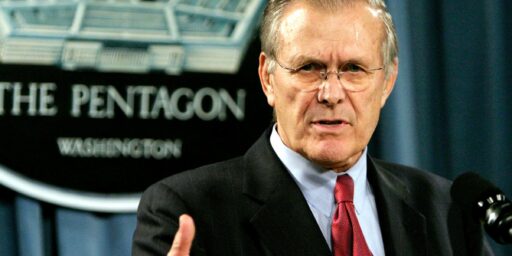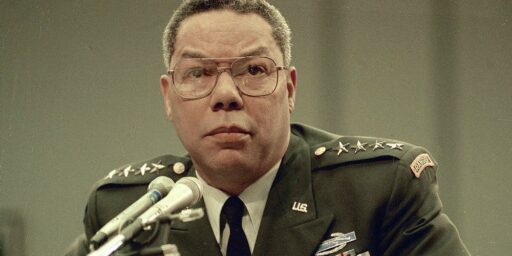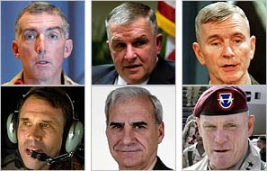National Security Team 2005
IHT: New U.S. Security Lineup Should Be Identified Now
Michael Gordon notes that there has been considerable speculation about whether Rumsfeld, Powell, and Rice would be back in a second Bush Administration. He provides a rather compelling argument for why, even at age 71, Rumsfeld is likely to stay on as SecDef and Powell is likely to step down. He also makes an interesting point.
Handicapping the new team is a favorite Washington pastime, but there are important issues at stake. Would Condoleezza Rice, who has come under scrutiny for her handling of counterterrorist policies prior to the Sept. 11, 2001, terrorist attacks in New York and Washington, stay if the president were re-elected, and in what capacity?
Now that there is an emerging consensus that intelligence agencies are badly in need of reform, who would direct the Central Intelligence Agency? If Powell leaves and Rumsfeld stays, who would take Powell’s place and try to contend with the strong-willed defense secretary and one of the most powerful vice presidents in American history?
The old way has been to decide on the jobs after the election. But figuring out the new lineup should not just be a matter for the pundits and political gossip mongers. American voters, and the world, would know more about the stakes in the November election, the future course of U.S. policies and the prospects for coherent U.S. diplomatic and military strategies if Bush and Senator John Kerry of Massachusetts, the presumptive Democratic nominee, would identify their future team now.
Given that we’re on a war footing and that this is likely to be the case regardless of who wins in November, it would indeed be of value to the voters to know who would be the key policy makers. The only down side that occurs to me offhand is that, if either Bush or Kerry had interest in filling one of these posts with a moderate from the other party, it would be awkward if not impossible to get such a commitment now. While one could see, say, John McCain as SecDef in a Kerry Administration, McCain couldn’t very well agree to the appointment now when there’s at least a 50-50 chance that Bush will be re-elected.






While I agree that this proposal would provide useful information to the public for the election, it’s a pipe dream. Anyone who intends to resign for the second term, and states so, would become a lame duck in the administration. All these quintessential Type A’s would promptly, but politely (maybe) ignore the resignee.
A much more likely scenario in my mind is that none of the major players resign. There’s just too much going on, and a change in one of these key positions would throw everything into a lurch.
Well, regrettably, maybe not SecState. But certainly Rumsfeld or Rice.
—